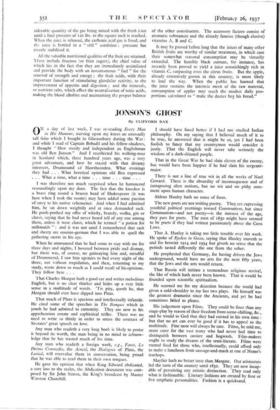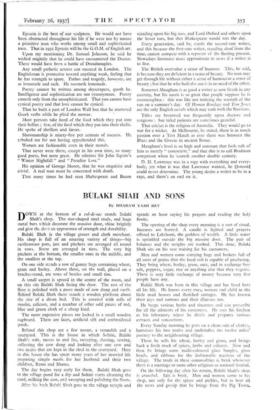JONSON'S GHOST
By CLIFFORD BAX
ON a day of last week, I was re-reading Every Man in His Humour, nursing upon my knees an unusually tall folio which I bought in Glastonbury during the War : and while I read of Captain Bobadil and his fellow-shadows, I thought " How sturdy and independent an Englishman was old Ben Jonson." And I recollected his walking-tour in Scotland which, three hundred years ago, was a very great adventure, and how he stayed with that dreamy introvert, Drummond cf Hawthornden. What evenings they had . . . What heretical opinions old Ben expressed . . . What a time, what a time . . . time . . . time . . .
I was therefore not much surprised when he hammered resoundingly upon my door. The fact that the knocker is a brass ring round a brazen head of Shakespeare (it was here when I took the rooms) may have added some passion of envy to his native vehemence. And when I had admitted him, he sat down weightily and at once demanded sack. He pooh-poohed my offer of whisky, brandy, vodka, gin or claret, saying that he had never heard tell of any one among them, unless it were claret, which he termed " a potion for milkmaids " : and it was not until I remembered that sack and sherry arc cousins-german that I was able to quell the gathering storm in his eye.
When he announced that he had come to stay with me for three days and nights, I hovered between pride and dismay, but there was, of course, no gainsaying him and, mindful of Drummond, I saw him upstairs to bed every night of the three, not without trepidation, and then, returning to my study, wrote down so much as I could recall of his opinions. They follow here . . .
That Charles Morgan hath a good ear and writes melodious English, but is no clear thinker and hides up a very little sense in a multitude of words. 'Tis pity, quoth he, that Morgan should ever have dipped into Plato.
That much of Plato is specious and intellectually infantile. He cited some of the speeches in The Banquet which in youth he had admired to extremity. They are now to his apprehension ornate and sophistical trifles. There was no need to write so thinly in order to stress the contrast of Socrates' great speech on love.
Any man who readeth a very long book is likely to praise it beyond its worth, the man being in no mind to acknow- ledge that he has wasted much of his time.
Any man who readeth a foreign work, e.g., Faust, La Divine Commedia, the Aeneid, the Dialogues of Plato, the Lusiad, will overvalue them in conversation, being proud that he was able to read them in their own tongues.
He gave his opinion that when King Edward abdicated, a sore loss to the realm, the Abdication document was com- posed by Sir John Simon, the King's broadcast by Master Winston Churchill. I should have fared better if I had not studied Indian philosophy. On my saying that I believed much of it to be true, he answered that it might be so, yet I had been foolish to fancy that my countrymen would consider it justly. That the English will never take seriously the wisdom of a dark-skinned people.
That in the Great War he had slain eleven of the enemy, but would have been happier if he had slain his sergeant- major.
There is not a line of true wit in all the works of Noel Coward. There is the absurdity of inconsequence and of juxtaposing alien notions, but no wit and no pithy com- ment upon human character.
Aldous Huxley hath no sense of form.
The new poets are not writing poetry. They are expressing youthful political yearnings toward Communism, but since Communism—and not poetry—is the interest of the age, they pass for poets. The men of 183o might have seemed to be poets if they had written passionately about the Corn Laws.
That A. Huxley is taking too little trouble over his work. He spoke of Eyeless in Gaza, saying that Huxley moveth to and fro betwixt 1914 and 1934 but giveth no sense that the periods tasted differently the one from the other.
He prophesied that Germany, for having driven the Jews underground, would have no arts for the next fifty years, that the Jews and the arts would return.
That Russia will initiate a tremendous religious revival, the like of which hath never been known. That it would be founded upon scientific spiritualism.
He scorned me for my dejection because the world had given a cold-shoulder to my last two plays. He himself was the greatest dramatist since the Ancients, and yet he had sometimes failed to please.
His judgement upon Films. They could be finer than any stage-play by reason of their freedom from scene-shifting, &c., and he would to God that they had existed in his own time : but that no art can ever be good if it has to appeal to the multitude. Fine taste will always be rare. Films, he told me, must cater for the vast many who had never had time to distinguish between caviare and hogwash. Film-Makers ought to study the dreams of the semi-literate. Films were mental food for those who, intellectually, could afford only to make a luncheon from sausage-and-mash at one of Nemo's teashops.
Mayfair hath no better taste than Margate. Our aristocrats led the taste of the country until 1832. They are now incap- able of perceiving any artistic distinction. They read only what is fashionable. Literary fashions are created by four or five emphatic personalities. Fashion is a quicksand. Epstein is the best of our sculptors. He would not have been obstrticted throughout his life if he were not by nature a primitive man who works among small and sophisticated men. That in 1951 Epstein will be the G.O.M. of English art.
Upon my mentioning Dr. Samuel Johnson, he said he wished mightily that he could have encountered the Doctor. There would have been a battle of Dreadnoughts.
Any small pathetic actress can succeed in London. The Englishman is protective toward anything weak, feeling that he has strength to spare. Pathos and tragedy, however, are as lemonade and sack. He scorneth lemonade.
Poetry cannot be written among skyscrapers, quoth he. Intelligence and sophistication are not synonymous. Poetry cometh only from the unsophisticated. That you cannot have cynical poetry and that love cannot be cynical.
That he built a part of London Wall but that he muttered Greek verbs while he plied the mortar.
Most persons take heed of the food which they put into their bellies ; few, of the food which they put into their skulls. He spoke of thrillers and farces.- Showmanship is ninety-five per centum of success. He rebuked me for not having apprehended this.
Women- are fashionable even in their morals.
That never were there, except in his own time, so many good poets, but none great. He admires Sir John Squire's " Winter Nightfall " and " Paradise Lost."
His opinion of George Moore, that he was exquisite and trivial. A real man must be concerned with death.
That many times he had seen Shakespeare and Bacon standing upon his big toes, and Lord Oxford and others upon the lesser toes, but that Shakespeare would win the day.
Every generation, said he, extols the second-rate writer, and this because the first-rate writer, standing aloof from the time, cannot compete with a reporter of the fleeting present. Nowadays literature must approximate to news if a writer is to live.
The British overvalue a sense of humour. This, he said, is because they are deficient in a sense of beauty. No man may get through life without either a sense of humour or a sense of beauty ; but that he who hath the one is in no need of the other.
Somerset Maugham is as good a writer as now liveth in any country, but his merit is so great that people suppose he is commonplace : this was like not noticing the warmth of the sun on a summer's day. Of Human Bondage and Tom Jones are the only English novels which may rank with the Russians.
Titles are bestowed too frequently upon doctors and surgeons : but titled patients are sometimes grateful.
That cricket is the religion of Australia. They would go to war for a wicket. At Melbourne, he stated, there is as much passion over a Test Match as ever there was between the Blues and the Greens in ancient Rome.
Maugham's level is so high and constant that fools talk of him as merely " competent," and that this is to call Bradman competent when he scoreth another double century.
D. H. Lawrence was in a rage with everything and every- body, yet what it was that Lawrence wanted, he [Jonson] could never determine. The young desire a writer to be in a rage, and there's an end on it.



















































 Previous page
Previous page